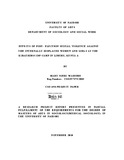| dc.description.abstract | This research was concerned with the examination of the key aspects of post-election sexual violence among the internally displaced persons focusing on women and girls at the Kirathimo IDP Camp in Limuru. The research design used was the survey. The study sample population consisted of the sexually violated women and girls at the Camp. A sample of 60 respondents was drawn using convenience/accidental sampling. Both primary and secondary sources of data were used in this study. Secondary data was collected by way of reading, analyzing, collating and recording data contained in ready prepared materials.
Primary data was collected through direct observation and interviews using a structured open and closed ended interview .schedule which was administered to the respondents through face to face interviews. Information relating to the subject under investigation was also obtained from three key informants. The Statistical Package for Social Sciences (SPSS) was used to analyze the quantitative data. The data was presented in form of frequency and percentage tables, pie and bar charts. The information was presented thematically guided by the objectives of the study.
The major findings of the study were that internally displaced women and girls in IDP camps faced a number of forms/types of sexual violence' the most common ones being battery/beating and rape. The effects of the violence on the victims included contracting HIV/AIDS, low self esteem, stigmatization or depression, unwanted pregnancies, abortions and/or miscarriages, pain/injury, trauma and death. The study also found that the sexual violence coping mechanisms employed by the victims were numerous, both positive and negative such as seeking medical attention/going for VCT services, keeping quiet.
The intervention strategies employed to address sexual violence against women and girls in camp included; provision of security, improvement of camp lighting, involving group leaders in problem solving, forcing abusers out of the Camp, assisting in repatriation and resettlement and meeting basic needs of the persons in IDP camps. However, efforts to address the problem faced challenges/constraints such as inadequate finances, presence of criminals in camp, hostility of locals, lack of medical care and poor reporting systems.
The way out of these constraints/challenges could come by ways such as through proper planning at the camp, involving government security forces in the protection of IDPs at the camp, provision of family tents and establishment of recovery centres.
This study recommends that adequate resources be sourced and all mps repatriated and resettled back in their original farms or other safer areas. However, before all mps are resettled, it is recommended that those still in camps be provided with their basic needs. The Sexual Offences Act of 2006 should also be strictly enforced in order to deter the perpetrators of the sexual violence vice in Kenya in general and IDP Camps in particular. | en_US |

